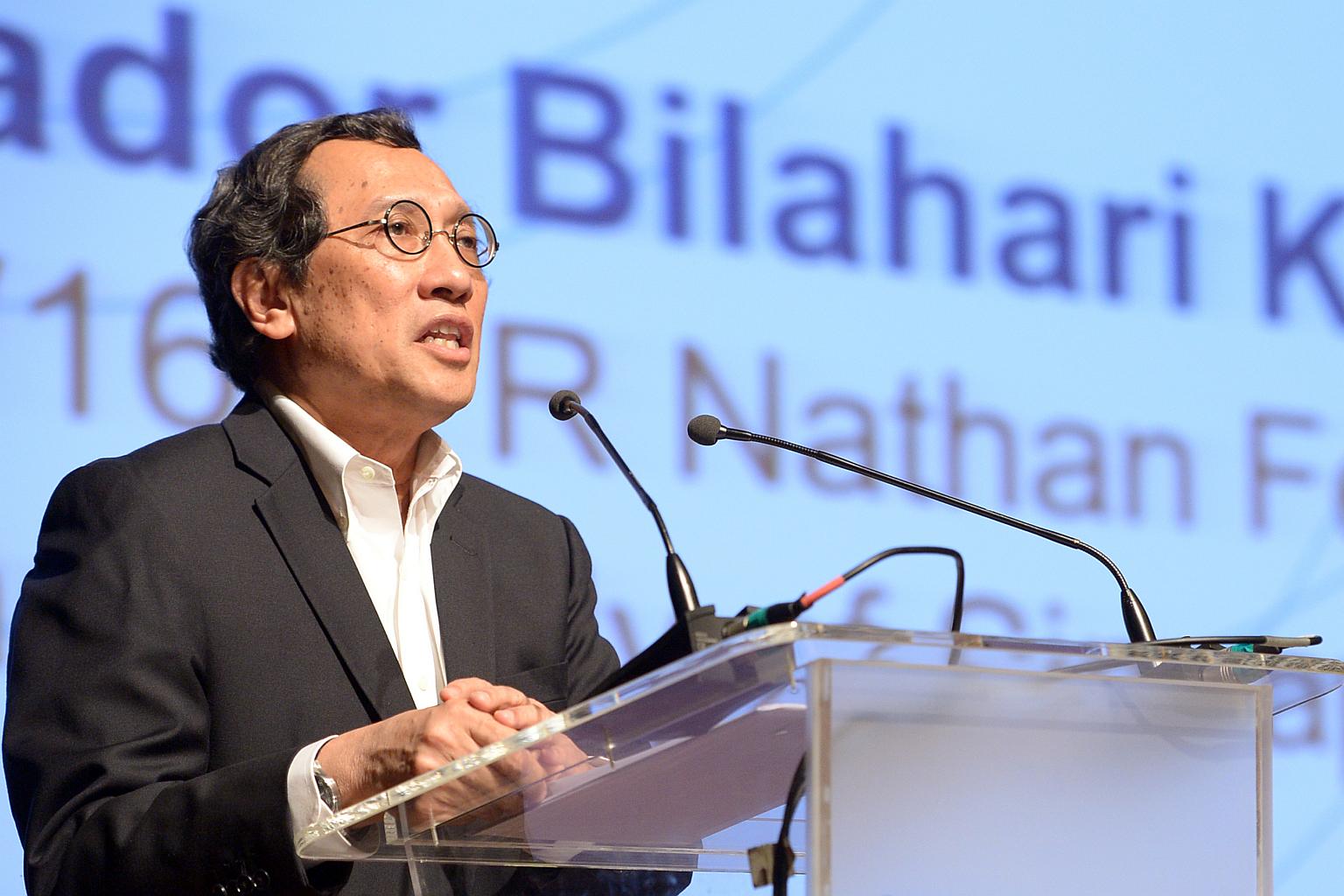Domestic strength key for Singapore to stay relevant: Bilahari
Veteran envoy stresses three aspects that are crucial for that internal strength
Sign up now: Get ST's newsletters delivered to your inbox

Ambassador-at-large Bilahari Kausikan.
ST PHOTO: DESMOND WEE
Rachel Au-Yong
Follow topic:
Singapore, as a small city-state, needs to have a sound domestic foundation in order to remain relevant in the international arena, said ambassador-at-large Bilahari Kausikan.
And that internal strength hinges on three aspects: politics, policy and the role of the civil service, and social cohesion, Mr Bilahari said yesterday in his fifth and final lecture as the Institute of Policy Studies' S R Nathan Fellow.
With politics, partisan interests should be kept out of foreign policy. But in reality, this is hard to achieve, he added.
In countries with long histories, partisan debates over foreign policy are conducted in a framework of shared assumptions on what ought to be in the fundamental interests of the nation, regardless of which party is in power, he said.
Singapore's opposition parties, so far, have not shown they "have any concept of the fundamental national interest", he added.
Mr Bilahari criticised the Workers' Party's Mr Pritam Singh for asking in Parliament in 2013 about Singapore's Middle East policies that "could have stirred up the feelings of our Malay-Muslim ground against the Government".
Noting that Singapore has been consistently even-handed in its relations with Israel and Palestine, he said: "The Arab countries understand our position and have no issue with our relations with Israel.''
Also excoriated was the Singapore Democratic Party's Dr Paul Tambyah, who called for a reduction in the defence budget in favour of health spending, pointing out that Singapore had a history of being non-aligned in its foreign policy.
Mr Bilahari retorted: "If the good doctor really thought that being non-aligned is an adequate substitute for deterrence through a strong SAF, he ought to consult a doctor of another sort without delay: a psychiatrist."
As for policy and the role of civil service, the veteran diplomat said it was important to have alertness, agility and an appreciation of nuances to navigate an uncertain external environment.
But the way the civil service is structured - with agencies led by Administrative Service officers who are generalists - "may have begun to degrade these qualities".
He cited the case of a Singapore agency that had signed a memorandum of understanding with China that specified disputes would be settled in Chinese.
"It broke a long-established principle of insisting that English should be the controlling language," he said.
"This was not a question of linguistic competency but of Singapore's identity," he added.
Things are changing, however.
He noted a new programme introduced in 2013 that lets members of specialist services be appointed to senior positions previously reserved for Administrative Service officers.
But whether the change is fast and far enough remains to be seen, he said.
On social cohesion, Mr Bilahari warned of Western diplomats trying to weigh in on Singapore's issues like the death penalty or gay rights, without paying attention to social and cultural fault lines.
China, however, poses "a more delicate and fundamental challenge", especially with how it approaches its ties with Chinese communities in South-east Asia.
Chinese officials often refer to Singapore as a "Chinese country", which Singapore leaders "politely but clearly and firmly" refute.
Accepting this characterisation of Singapore would not only provoke a counter-reaction from other major powers, but also strain, if not break, the multiracial compact on which Singapore's success is built, he said.
At the same time, it would be foolish to alienate China which would have a huge impact on Singapore's economic future, he added.
"Maintaining a good relationship with China, while preserving the autonomy to pursue our interests as we define them is the fine line we must walk."
Mr Bilahari also said many Singaporeans, especially younger ones, do not understand fully the complexity of the contradictory forces at play. The situation is aggravated by the move to de-emphasise history in the national curriculum, he noted.
However, he is not pessimistic about Singapore's ability to cope with the challenges ahead.
"We will cope if we continue to be clinical in our understanding of our own situation and hard-headed about what may need to be done," he said.
"We will fail only if we lose our sense of vulnerability because that is what keeps us united, agile and alert."
NOTE: Mr Bilahari, in his speech, cited the case of a Singapore agency that had signed a memorandum of understanding with China that specified disputes would be settled in Chinese. He has since informed the Institute of Policy Studies that the agency has told him it has rectified the situation. This point has been deleted from the published version of his speech.

